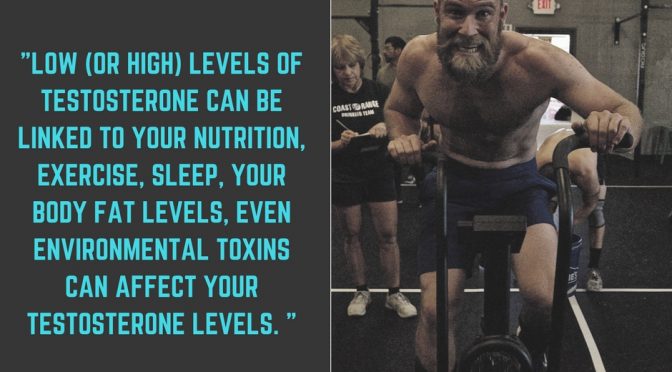
teˈstästəˌrōn
If you have ever been watching TV late at night, or a sporting event like football, chances are you have seen a commercial advertising some sort of medication to treat low testosterone levels. They seem to always prey on our masters athletes – our silverback studs getting after it in the gym, promising their pill will solve their problems, only to start 20 other side effects that for whatever freaking reason always includes anal leakage.
But what about the women? Yes, ladies can have low testosterone levels too!
I’m also here to tell you low (or high) levels of testosterone can be linked to your nutrition, exercise, sleep, your body fat levels, even environmental toxins can affect your testosterone levels.
First, let’s talk about what important role it has with everyone.
For men, it regulates erectile function and sex drive (um, duh!). However, it also plays an important role in strength, bone mass, fat distribution and muscle mass.
For women, it has similar roles for strength, lean muscle and bone mass (all which make up the lean body mass that all of you were watching for during the latest nutritional challenge). Testosterone also assists in regulating sexual function in women too.
The Highs and Lows
Some may associate low levels of testosterone with their libido and sex drive. While this is true, it is not the only symptom. Other symptoms include decreasing muscle mass, brain fog, difficulty with concentrating, thinning of hair or skin, hot flashes, depression, lack of drive, low self esteem or self confidence, tiredness, and lastly, weight gain.
Conversely, symptoms of high levels of testosterone are irritability, aggressive behavior, acne or oily skin, enlarged prostate (men), weight gain around the midsection, failure to sleep through the night, high blood pressure. For men, thinning of hair on the top of the head; for women, it’s facial hair growth, chin hair, or chest hair.
What affects testosterone levels?
Nutrition.
Yep, not only can poor nutrition affect your performance, but it can affect your hormones too. The consumption of white sugar, soy, alcohol and trans-fats has an impact on testosterone levels in both men and women.
Exercise.
How much you weigh, how old you are, your fitness level and how or what you do to workout can affect how much testosterone is produced. Testosterone is boosted post exercise, but those levels do not stay elevated for very long.
The high intensity interval training has the best results for increasing testosterone production. Resistance training also elicits a high level of testosterone production when those exercises reflect the use of heavier weights and shorter breaks between sets.
Exercise can have the reverse effect if taken to the extreme (aka, overtraining). This results in production of cortisol (the stress hormone) and applies oxidative stress to the body.
Stress.
Any kind or type or prolonged or chronic stress (emotional, physical, or dietary) has negative effects on testosterone production. When our body is under stress, its focus is not reproduction, but on survival. Thus, creating testosterone is not on the top of its list.
Environmental Toxins.
There are hormone disrupting chemicals found in plastics, pesticides, and personal care products (disinfectants and anti-bacterials, fragrances, cosmetics) non-stick coated cooking products, and canned/packaged food replacement products. These man-made chemicals can impair our glands to produce testosterone.
Adipose Tissue (Body Fat).
Low testosterone levels can also be a factor if someone is obese. This is because when we have more body fat, there is a greater chance testosterone will be converted to estrogen. This is created by a process called aromatization. Aromatization mainly takes place in our fat cells.
Alcohol.
Alcohol depletes zinc in your body, which results in lower testosterone production. Alcohol also increases estrogen. When alcohol enters the bloodstream, the body treats it as a toxin and its primary goal is to remove it. Everything else is put on standby. So when your liver is trying to rid the body of used hormones, they instead get re-circulated throughout the body, creating an imbalance.
Sleep.
To maintain an adequate level of testosterone, a minimum of 7-8 hours of sleep is needed. A reduced sleep of 5 hours a night can result in a reduction in testosterone by 15 percent.
So make sure to exercise, eat the right foods, remove as many stressors in your life that you can, reduce the alcohol, and get enough sleep. Your health depends on it – more ways than you may think!
By Brett Freliche
If you have any questions regarding this blog post or anything nutrition related, please contact Brett, Brittany or Wes at coastrangenutrition@gmail.com.
2018 03 19